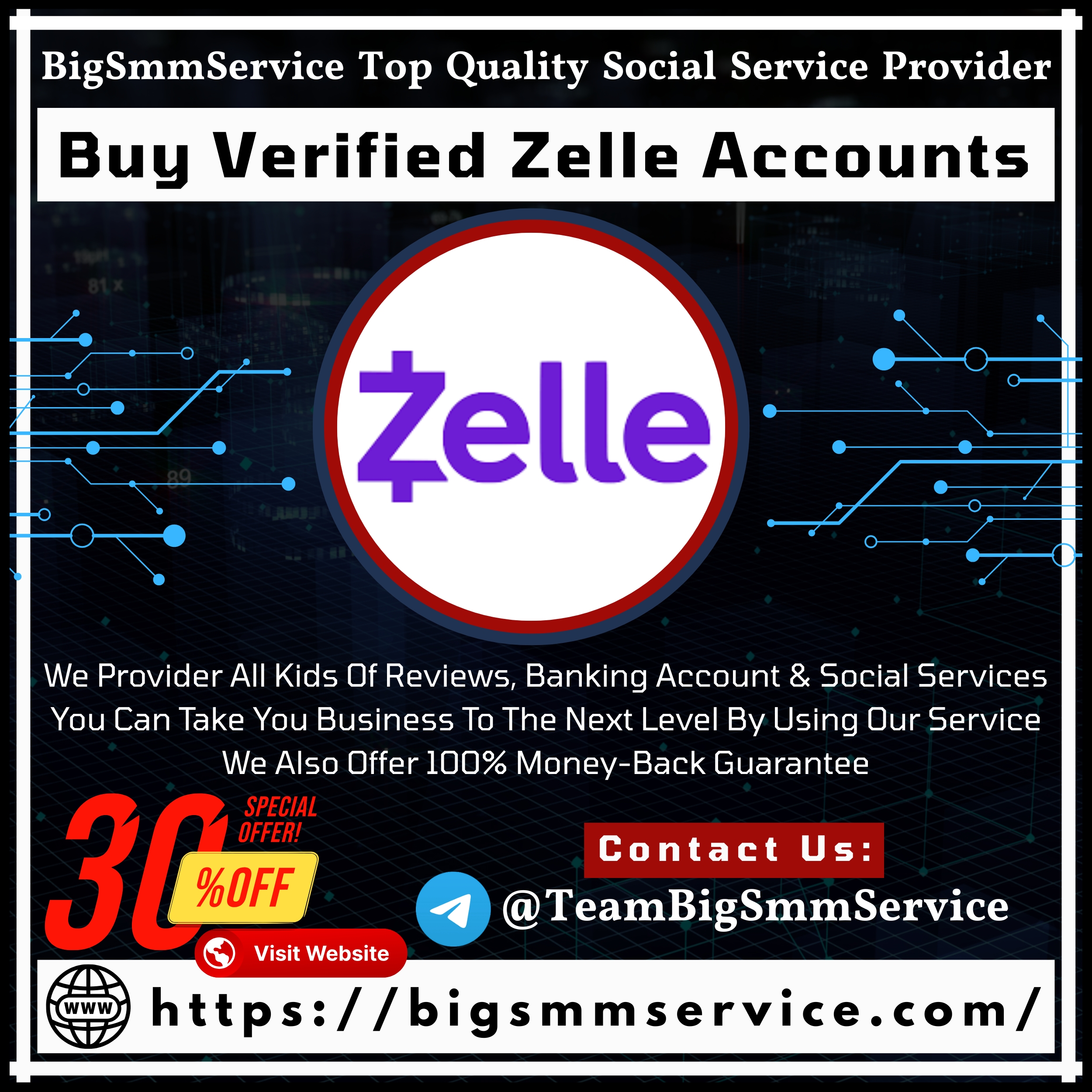Buy Verified Zelle Accounts
In the ever-accelerating evolution of digital finance, speed and trust dominate the value equation. As traditional banks face growing competition from fintech disruptors, one peer-to-peer payment platform has quietly become a linchpin of rapid, bank-integrated money transfers in the United States: Zelle.
Used by millions for everything from splitting a dinner bill to processing business transactions, Zelle is fast, seamless, and tightly linked to verified banking institutions. However, as demand for streamlined transactions grows—and access to these services becomes more tightly regulated—a burgeoning gray market has emerged where individuals and businesses seek to buy verified Zelle accounts for strategic, and sometimes questionable, purposes.
This trend raises a host of questions, from practical motivations to regulatory implications. It also reveals the expanding importance of digital identity and verification in shaping how financial systems operate today.
Understanding Zelle and Its Unique Position in Fintech
Zelle is not a standalone wallet or crypto-based solution. Rather, it’s a network connecting over 1,700 banks and credit unions across the U.S., allowing users to send and receive funds within minutes. What sets Zelle apart from apps like Venmo or Cash App is its direct integration into users’ existing bank accounts.
This architecture offers a distinct advantage: no need to preload balances or link third-party cards. However, it also means that Zelle accounts require full banking verification, including government-issued ID, Social Security number, and often, mobile verification.
That high bar of entry is precisely why some users opt to buy verified Zelle accounts, sidestepping hurdles while gaining immediate access to high-trust digital payment infrastructure.
Why People Buy Verified Zelle Accounts
The motivations behind the choice to buy verified Zelle accounts vary, but they typically fall into several distinct categories. In each case, the underlying driver is access—access to functionality, credibility, and flexibility.
1. Speed of Entry
Setting up a Zelle-compatible account through a traditional bank can take days or even weeks. For entrepreneurs, freelancers, and service providers who need immediate payment capabilities, purchasing a pre-verified account offers instant activation.
2. Bypassing Regional or Institutional Restrictions
Zelle is only available to individuals with U.S. bank accounts. Foreign residents, digital nomads, or expatriates looking to operate within the American financial system often hit barriers. To gain a foothold, some opt to buy verified Zelle accounts that are linked to legitimate U.S. institutions.
3. Avoiding Repetitive Verification Processes
Frequent business transactions, especially for e-commerce or digital goods, can trigger account reviews or flags. Verified accounts with clean transaction histories are seen as more resilient to scrutiny.
4. Operating Multiple Accounts
For logistical or strategic purposes, some businesses or marketers use multiple Zelle accounts to separate revenue streams, manage client payments, or optimize reconciliation. Buying verified accounts simplifies this expansion without undergoing repeated onboarding procedures.
The Anatomy of a Verified Zelle Account
When someone seeks to buy verified Zelle accounts, they’re not merely purchasing login credentials. A genuine verified Zelle account typically includes:
-
A fully active U.S.-based bank account (e.g., Bank of America, Wells Fargo, Chase)
-
Verified personal details (name, SSN, address, and sometimes utility bills)
-
A linked phone number and email address
-
A clean transaction history with no flagged activity
-
Compatible mobile access for iOS or Android Zelle apps
High-quality accounts also include control of recovery methods—password resets, 2FA access, and customer service PINs—to ensure transferability and minimize the risk of account reclamation by the original owner.
The Market: Where and How People Buy Verified Zelle Accounts
The ecosystem surrounding these transactions is largely hidden from the public eye. Transactions occur in encrypted chat platforms (Telegram, Discord, Wickr), dark web marketplaces, and invitation-only forums.
Pricing varies based on the associated bank, account age, and documentation provided. Here’s a general spectrum:
-
Basic Zelle-Enabled Bank Account: $200–$400
-
Fully Verified Zelle Account with Transaction History: $500–$1,200
-
Aged Accounts With Proof of Clean Activity: $1,500+
Buyers often prefer accounts tied to major banks, as these are less likely to trigger fraud alerts or face limitations during high-volume transactions.
Risks and Pitfalls
While the opportunity to buy verified Zelle accounts may seem attractive, the dangers are both real and significant.
Legal Exposure
Zelle is regulated under U.S. financial law, including the Bank Secrecy Act and AML (Anti-Money Laundering) standards. Purchasing an account registered to another individual could constitute identity fraud or money laundering, depending on use case and intent.
Account Recovery by Original Owner
Unless the buyer secures all recovery mechanisms, the original account owner can reclaim access, leaving the buyer locked out—and potentially with frozen funds.
Platform Ban and Blacklisting
Zelle’s fraud detection systems are robust. If a transaction pattern appears suspicious or deviates from a user’s history, the account can be flagged, restricted, or banned entirely.
Financial Loss
Because the market is informal and unregulated, scams are rampant. Many buyers report being defrauded by anonymous sellers who vanish after receiving payment—often in non-refundable forms like cryptocurrency.
Ethical Dimensions and the Shadow Economy
The choice to buy verified Zelle accounts intersects with broader conversations about digital identity and economic inclusion.
For individuals denied access due to citizenship, documentation, or location, these accounts represent more than convenience—they are keys to participation in a digitized economy. But when these transactions operate outside regulatory frameworks, they erode trust in the systems designed to protect users.
Moreover, the commodification of identity data—SSNs, phone numbers, utility bills—raises deep concerns about consent and privacy. As long as the demand persists, so too will the exploitation of stolen or synthetic identities.
The Regulatory Backdrop
Zelle, operated by Early Warning Services (a consortium of major U.S. banks), maintains strict compliance protocols. Banks are required to monitor user behavior, implement KYC checks, and report suspicious activity.
Government agencies including FinCEN and the FBI have identified money mule schemes, account takeovers, and fraud rings using peer-to-peer platforms like Zelle. These agencies continue to monitor illicit trade in verified financial accounts, particularly those that can be used to launder proceeds from scams or ransomware attacks.
Thus, anyone who chooses to buy verified Zelle accounts risks entanglement in broader investigations or financial surveillance efforts.
Safer Alternatives to Buying Verified Accounts
Instead of entering this precarious market, there are legitimate pathways to access Zelle services:
1. Open a U.S.-Based Account Through Legal Channels
Many digital banks like Chime or Wise (with U.S. routing numbers) offer onboarding to international users under specific conditions. While they may not directly integrate with Zelle, they provide a legal first step.
2. Work With Financial Intermediaries
Some licensed U.S. businesses offer payment facilitation services. Though slower and more expensive, they provide legal cover and transparency.
3. Use Alternative Platforms
For users outside the U.S., services like Payoneer, Revolut, and TransferWise may offer faster onboarding and equivalent transfer speeds—without compromising identity or legality.
The Psychology of Digital Trust
Underneath the practice of choosing to buy verified Zelle accounts lies a deeper narrative: the psychology of digital trust. Users are conditioned to trust verification—whether it’s a badge, a biometric scan, or a transaction history. In turn, that trust enables frictionless interactions.
Buying a verified account, then, is an attempt to artificially manufacture that trust. In a world where time is money, shortcuts are tempting. But shortcuts can become trapdoors if they compromise integrity or expose users to systemic risks.
As digital transactions become more embedded in our daily lives, the need for trusted identities—portable, verifiable, and legally sound—will only grow.
The Future of Verified Digital Accounts
With the emergence of decentralized identity protocols, the very nature of account verification is undergoing transformation. Soon, blockchain-based identity wallets could render traditional verification obsolete, allowing users to carry their credentials across platforms without repeatedly sharing personal data.
Until that day, the friction between access and compliance will continue to fuel the demand to buy verified Zelle accounts. For some, it will be a tool of empowerment. For others, a ticking time bomb.
Conclusion
In the financial landscape of 2025, identity is power. The decision to buy verified Zelle accounts is often a reflection of the system’s complexity, exclusivity, and inefficiency. It’s a workaround—a way to navigate a digital ecosystem that doesn’t always move at the speed of ambition.
Yet, while the short-term benefits may be seductive, the long-term implications can be dire. Legal risks, ethical compromises, and platform vulnerability all accompany these accounts like a shadow.
Ultimately, as financial platforms and regulatory bodies race to keep pace with user ingenuity, one truth remains: trust—whether bought or built—is the cornerstone of all digital transactions. And in the economy of tomorrow, integrity may be the most valuable asset of all.






Reviews
There are no reviews yet.